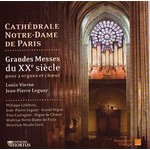
Grandes Messes du XX siecle
 $41.00
Out of Stock
$41.00
Out of Stock6+ weeks add to cart
LOUIS VIERNE / JEAN-PIERRE LEGUAY
Grandes Messes du XX siecle
Philippe Lefebvre, Jean-Pierre Leguay (Grand Organ) / Maitrise Notre-Dame de Paris / Nicole Corti
[ Editions Hortus / CD ]
Release Date: Saturday 15 March 2008
This item is currently out of stock. It may take 6 or more weeks to obtain from when you place your order as this is a specialist product.
"Yet another highly stylish and well presented release from the French label, Editions Hortus. As with everything produced by Hortus this is highly recommendable." (MusicWeb)
"Yet another highly stylish and well presented release from the French label, Editions Hortus. And, yes, it does feature yet another recording of the Vierne Messe Solenelle. This is the first, as far as I know, to be recorded in the room for which it was intended, and the combination, and, especially, the contribution of the organs makes for compelling listening.
Among the current crop of recordings of the Messe Solennelle, this scores highly. The organ-playing is top drawer, Philippe Lefèbvre especially in his element at the grand orgue. And if the large mixed choir isn't quite up the to standards of Westminster Cathedral on Hyperion, it scores much higher than the Toulouse ensemble 'Les Elements' featured on the Temperaments/Radio France recording with Michel Bouvard playing the St Sernin Cavaillé-Coll. If the choir is all-important, then Westminster Cathedral is the one to have. If the organ has to be French on the other hand then it's a straight fight between this and the Festivo recording featuring Christine Kamp playing the utterly sublime Cavaillé-Coll in Rouen. The Notre-Dame organ is a little less authentic of course, post-Cochereau, though still stunning in its own way. My choice would be for the present recording, but only just; the more fluid tempi seem to me a touch more natural. Actually, go out and buy both, neither will disappoint and the contrast between the organs is fascinating.
Another element which may colour your choice however, might be the coupling. While the Festivo release is part of a cycle of Vierne's organ works, the present coupling, Jean Pierre Leguay's Mass, is a very different kettle of fish; highly atonal, making stunning use of the space for which it was written, and featuring improvisatory elements in the grand-orgue part. This won't, in short, be for everyone. The sheer drama of the Sanctus, with its enormous dynamic contrasts between the soprano solo, and the tom-toms on the one hand, and the enormous organ tutti (plus brass) discords on the other is, in any case, breathtaking. Leguay's 6 to 8 part, highly complex, choral writing and imaginative use of the brass instruments greatly adds to this colourful work.
As with everything produced by Hortus this is highly recommendable. My only gripe is that, at under 55 minutes, the CD is seriously short. A shame then, that the opportunity wasn't taken to allow another mass for two organs and choir to be heard. A good example might have been the work by Léonce de Saint-Martin, who was after all titulaire of the grand-orgue between Vierne and Leguay."
(MusicWeb Oc 2007)
Tracks:
Louis VIERNE (1870-1937)
Messe solennelle, pour deux orgues et choeur op 16 (1900) [22:39]
Jean-Pierre LEGUAY (b.1939)
Missa Deo Gratias, pour soprano solo, choeur mixte, deux orgues, deux trompettes, deux trombones et percussions (en exécutant) (2000) [30:26]